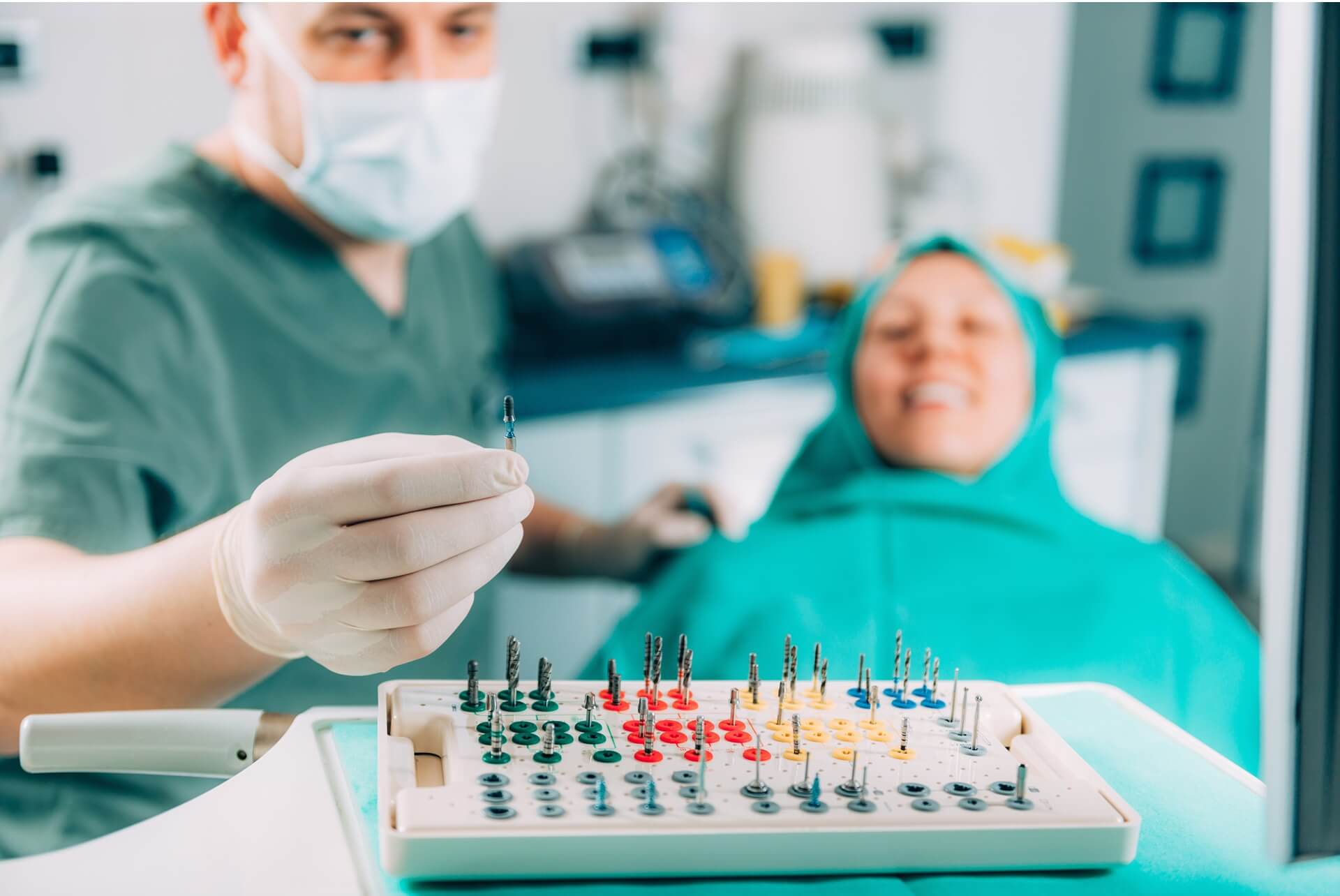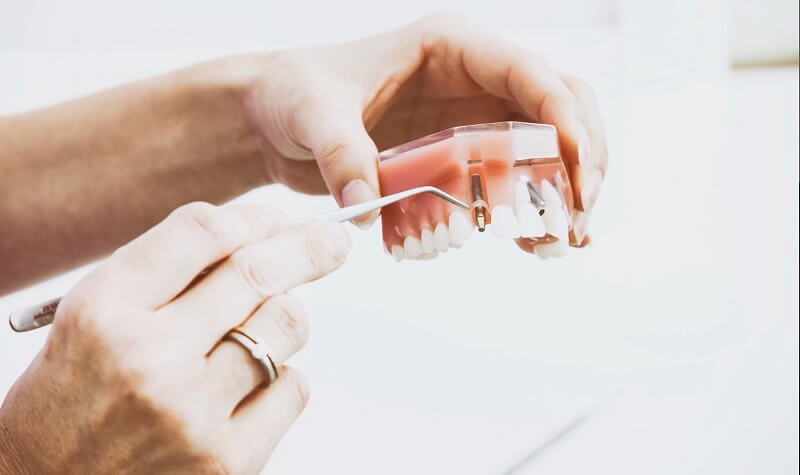For those who have been considering dental implants, you probably have because you’ve heard great things. Dental implants provide a more comfortable way to replace missing teeth. They also are more sturdy than dentures, meaning that the dental restoration won’t fall out while chewing or speaking.
How often do dental implants need to be replaced? This is a crucial question for anyone who has undergone the transformative procedure of getting dental implants. Dental implants have revolutionized the way we approach dental restorations, offering a durable and aesthetically pleasing solution. But like any medical procedure, understanding their lifespan is key to maintaining your oral health and well-being.
In this article, you’ll learn the essential aspects of dental implant longevity. We’ll cover the average lifespan of dental implants, factors that influence when they need to be replaced, and how you can care for them to maximize their durability. Knowing this not only helps in planning for future dental care but also in maintaining the investment you’ve made in your smile.
While dental implants may seem like a newer innovation in the dental field, they’ve been around for decades. Dental implants were first created back in 1952. A Swedish native, Ingvar Brånemark used his background as an orthopedic surgeon to create a better way to affix dental restorations. However, it wasn’t until 1982 that they made their first splash in the dental community. Since then, ongoing research has been done to improve the durability and long-lasting abilities of these titanium posts. But the good news for patients is they can already expect amazing results.
“Dental implants are so natural looking that you will forget you ever lost a tooth!” Says Dr. Marchbanks, at Mark C. Marchbanks Family Dentistry.
Key Takeaways
- Dental implants can last 25+ years with proper care, but are not considered permanent.
- Signs of dental implant failure include infection, loose implant, nerve damage, sinus problems, and peri-implantitis.
- Regular visits to the dentist every six months are recommended for implant maintenance.
- Non-implant alternatives for replacing missing teeth include bridges, which rely on the health of surrounding teeth.
- Tooth-supported fixed bridges are comparable to dental implants with few disadvantages.
General Lifespan and Replacement Frequency
The longevity of dental implants is a testament to modern dental advancements, offering a semi-permanent solution to tooth loss. Typically, with proper care, dental implants can last a lifetime. The American Dental Association (ADA) and various dental studies have shown that the lifespan of a well-maintained implant can be upwards of 25 years or more. This durability stems from the implant’s design, which integrates with your jawbone, mimicking the root of a natural tooth.
Lifespan of Dental Crowns
However, it’s important to note that while the implant itself can last a lifetime, the crown attached to it often has a shorter lifespan. On average, dental crowns need to be replaced every 10 to 15 years. This discrepancy is due to the wear and tear that the crown experiences as it is used for biting and chewing, just like natural teeth. Factors like personal habits (e.g., grinding or clenching teeth), the material of the crown, and overall oral hygiene play significant roles in determining the crown’s longevity.
Timeframe for Replacement
The timeframe for replacement can vary significantly from person to person. Some individuals may find their implants lasting well beyond the average, especially with meticulous oral hygiene and regular dental check-ups. Conversely, those with underlying oral health issues or challenging lifestyle habits may need replacements sooner.
It’s crucial to maintain regular visits to your dentist to monitor the condition of your implants and crowns. These check-ups enable early detection of potential issues, ensuring that any necessary replacements or maintenance can be conducted promptly, thereby prolonging the overall lifespan of your dental implants.
Factors Influencing Implant Longevity
The lifespan of dental implants is not solely dependent on their inherent durability; several external factors play a pivotal role in determining how often they need to be replaced. Understanding these variables can help you extend the life of your implants significantly.
1. Material Quality
The materials used in both the implant and the crown significantly impact longevity. Implants are typically made from titanium, known for its strength and compatibility with human bone. Some implants use zirconia, another durable and biocompatible material.
2. Patient’s Oral Hygiene
Perhaps the most critical factor in implant longevity is oral hygiene. Regular brushing and flossing are very important in maintaining implant health. Poor oral hygiene can lead to peri-implantitis, a condition similar to gum disease, which can weaken the supporting bone and lead to implant failure.
3. Lifestyle Habits
Lifestyle choices can also impact the longevity of dental implants. Habits such as smoking or tobacco use have been linked to higher failure rates in implants. According to various studies, smokers had a significantly higher rate of implant failure compared to non-smokers. Additionally, habits like grinding or clenching teeth can exert excess pressure on implants, potentially leading to early wear or damage.
4. Regular Dental Check-Ups
Frequent dental visits allow for early detection and management of any issues. A routine check-up can identify problems like improper alignment or gum disease before they escalate, as noted by the Academy of General Dentistry.
5. Overall Health and Medical Conditions
General health conditions, such as diabetes or osteoporosis, can affect bone density and healing capacity, thereby impacting implant success. Controlled medical conditions are less likely to affect implant longevity hence the importance of managing overall health.
6. Age and Bone Quality
Age-related changes in bone density can influence implant stability. However, age alone is not a disqualifier for implants. Studies in Implant Dentistry have shown that implants are equally successful in older adults as in younger patients, provided the bone quality is adequate.
What Options Are Available with Implants?
Dental implants, if you don’t know, are titanium posts that are surgically placed by your dentist under the gum line or into the jawbone. These posts act as the support system for your dental restoration. Depending on your unique situation will dictate which implant-supported device your dentist will recommend. There are three main types:
-
- Implant-supported bridge
- Implant-supported denture
- Implant-supported crown
These are all similar to their non-implant counterparts, but the way they attach is much different. Instead of using other teeth or adhesives to stay in place, each of these connects to the abutment of the implant and uses that as their support.
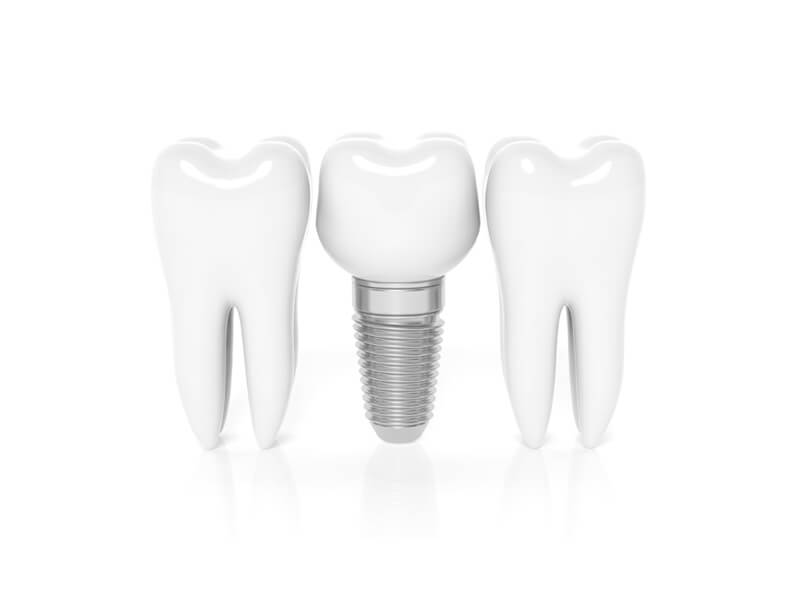
Are Dental Implants Permanent?
The American Association of Oral and Maxillofacial Surgeons has concluded that dental implants placed here in the United States by a licensed dentist have a 95% success rate on average. The success rate of the implant will significantly depend on who placed it, where it was placed, and how well a patient cares for it afterward.
To say that dental implants are permanent is not yet accurate. Research suggests that with proper care, a wearer can get 25 or more years out of the implant; it hasn’t concluded if they will last forever. But when compared to dentures and bridges that need to be replaced after ten years, then yes 25+ years is considered permanent. Most individuals won’t ever need to mess up or have their implants replaced in their lifetime.
Signs a Dental Implant is Failing or Has Failed
Anything human-made can fail. This is the case with dental implants. Though they are made of titanium, they still can have problems. There are two primary ways a dental implant can fail. The first is by shifting out of location. When an implant shifts, typically, there isn’t enough bone tissue to support placement. While dentists do everything in their power to ensure this doesn’t happen sometimes it can. Below are a few of the complications you could experience from the implant/surgery that could indicate a failure.
-
- An infection around the implant or surrounding area.
- A loose implant or the implant falls out entirely.
- Nerve damage to the gums. Includes numbness, pain, or tingling at the chin, gums, or lip.
- Presence of sinus problems, which aren’t normal to the patient. This could indicate the implant touching the sinus cavity.
- Uncommon, but peri-implantitis. The bone and gum surrounding the implant are inflamed with a bacterial infection or inflamed from an aggressive bite force.
- Peri-implantitis is treatable. You must see your dentist for treatment, though. Without treatment, you could be risking the implant and damaging the site where the implant was placed. If you notice any of these above signs, you should consult with your dentist. While complications can happen, they may be avoidable if you follow the recommendations from your dentist.
Signs That Your Dental Implant Needs Replacement
Recognizing when a dental implant needs replacement is crucial for maintaining oral health and ensuring the continued effectiveness of the implant. There are several signs and symptoms to be aware of, which, if detected early, can lead to prompt treatment and possibly avoid complete replacement. Regular dental check-ups are essential for early detection of these issues.
-
- Discomfort or Pain: While some discomfort is normal immediately after the implant surgery, persistent or newly developed pain around the implant site is a red flag. This could indicate infection, inflammation, or issues with the implant’s positioning. It’s vital to consult your dentist if you experience prolonged discomfort.
- Mobility of the Implant: One of the most evident signs that an implant may need to be replaced is if it becomes loose or moves. An implant should be as stable as a natural tooth. If you notice any movement, it’s a strong indicator that the implant is not properly integrated with the bone, necessitating immediate professional assessment.
- Swelling or Inflammation of the Gums: Swelling or redness around the implant site can be a sign of infection or peri-implantitis, a condition similar to gum disease. This condition, if left untreated, can lead to bone loss and the weakening of the implant’s support structure.
- Difficulty Chewing or Biting: If you start experiencing difficulty or discomfort while chewing or biting, this might indicate a problem with the alignment of the implant or the wear and tear of the crown.
- Changes in the Fit of Your Bite: Over time, if you notice a change in the way your teeth fit together when you bite, this could be a sign that your implant is shifting, which could affect its longevity.
- Visible Damage or Wear to the Crown: While the implant itself is designed to be very durable, the crown may suffer from wear or damage over time. Cracks, chips, or significant wear on the crown are signs that it may need to be replaced.
- Gum Recession Around the Implant: Receding gums around the implant can expose the metal abutment or even the implant itself, which is not only aesthetically displeasing but can also indicate a loss of gum and bone support.
It’s important to address any of these signs as soon as they are noticed by consulting with your dental professional. Regular dental check-ups are essential in monitoring the condition of your implants and addressing any issues before they require complete replacement. Early detection and intervention can often prevent more serious complications and help maintain the integrity of your dental implants.
Will I Know if My Implants Need to Be Replaced?
Shortly after having the implant installed, there are some signs you’ll need to have it removed or replaced. If the implant travels, it will need to be removed and a new one installed. As will all surgeries, there is a chance of infection. If an infection is left untreated, it could damage the tissue. If you notice any warning signs such as a discharge from the wound, fever, or bleeding, you should contact your dentist right away. You should have regular visits with your dentist every six months.

Caring for Your Dental Implants
Proper care and maintenance of dental implants are crucial for their longevity and functionality. A comprehensive approach to care involves both diligent daily practices at home and regular professional dental check-ups.
Daily Care and Maintenance
The daily maintenance of dental implants is similar to the care required for natural teeth but with added attention to certain aspects. Brushing at least twice a day with a soft-bristled toothbrush and non-abrasive toothpaste is essential. This helps to prevent the buildup of plaque around the implant site. Flossing daily is equally important, as it removes food particles and plaque from the areas around the implant and under the gumline, areas where a toothbrush might not reach effectively.
Moreover, it’s advisable to avoid habits that could damage the implants, such as chewing on hard items like ice or hard candies. For those who smoke, cessation is strongly recommended, as smoking can impede healing and negatively affect the health of the implant. Additionally, using an antimicrobial mouthwash can aid in keeping the implant area free from harmful bacteria.
For individuals who grind or clench their teeth, addressing this issue is vital. These habits can exert undue pressure on the implants, potentially leading to damage. A dentist may recommend the use of a nightguard to protect the implants from the effects of grinding or clenching.
Further reading:
How to Care for My Dental Implants
Role of Professional Dental Care
In addition to at-home care, the role of professional dental care in maintaining dental implants cannot be overstated. Regular dental check-ups allow for the monitoring of the implant, the surrounding gums, and the overall oral health. During these visits, dentists can identify and address potential issues before they escalate into major problems.
Professional cleanings, performed by a dentist or dental hygienist, complement daily home care. These cleanings can reach and thoroughly clean areas that might be challenging to manage at home. They are crucial in preventing peri-implant diseases, such as peri-implantitis, which can lead to implant failure if left unchecked.
These comprehensive care practices, encompassing both daily maintenance and regular professional care, form the cornerstone of ensuring that dental implants last as long as possible, maintaining both their functionality and appearance.
Non-Implant Alternatives
Some are cautious about having oral surgery or don’t want to risk or chance implant failure. There are traditional methods you can use to replace missing teeth. These have worked for decades and are still relevant in the dental field. Other options include the following.
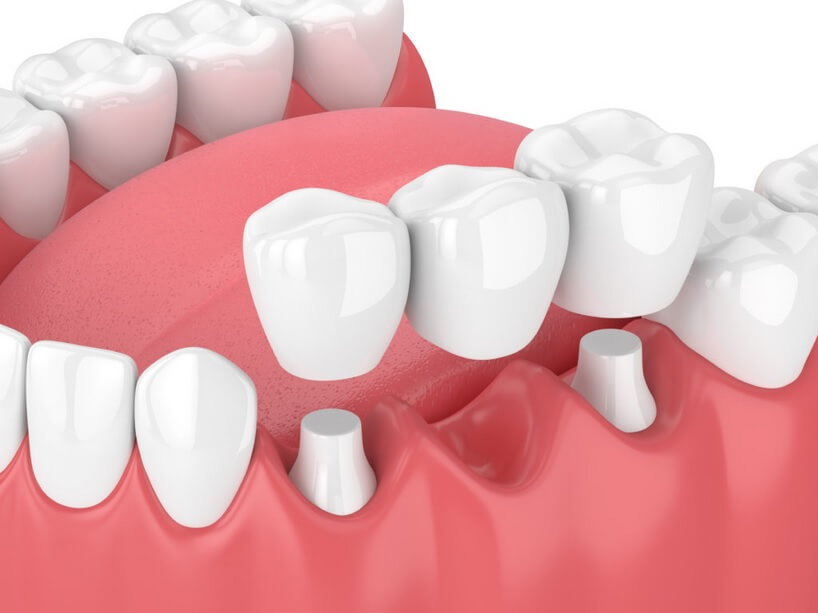
Bridges
Bridges can be tooth-supported or resin-bonded. No matter which option is selected, bridges semi-rely on the health of the surrounding teeth. Bridges are also designed to replace one to three missing teeth in a single area. They can’t fix teeth that are on opposite sides of the arch. A tooth-supported fixed bridge is comparable to a dental implant, with very few disadvantages. The only potential downside could be bone loss because the jaw bone isn’t being stimulated.
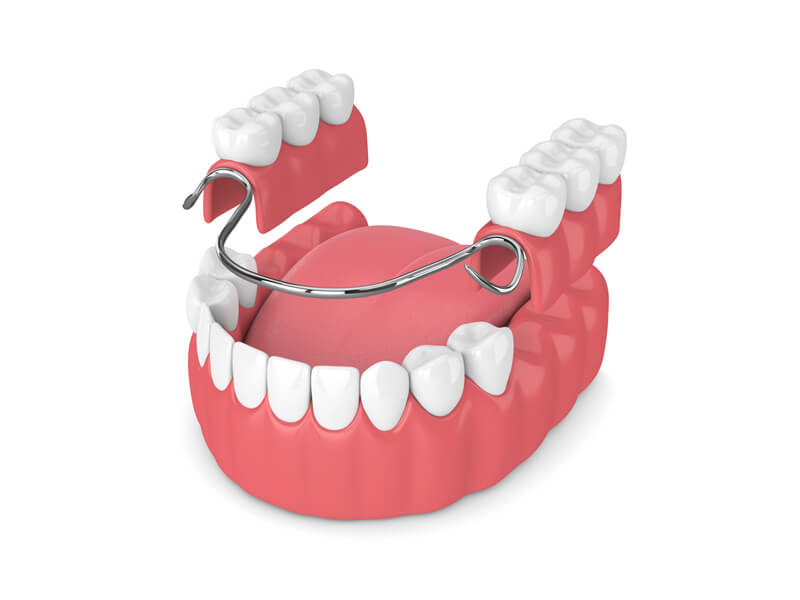
Partial Dentures
Partial dentures are adaptive. These can be used to fix several gaps in the top or bottom arch, regardless of their location. A partial denture will use your healthy teeth as support and a fake palate to hold everything in place. These aren’t extremely comfortable and are known to cause bone loss. These replace your teeth, gums, and bones. Partial dentures are more cost-effective than dental implants.
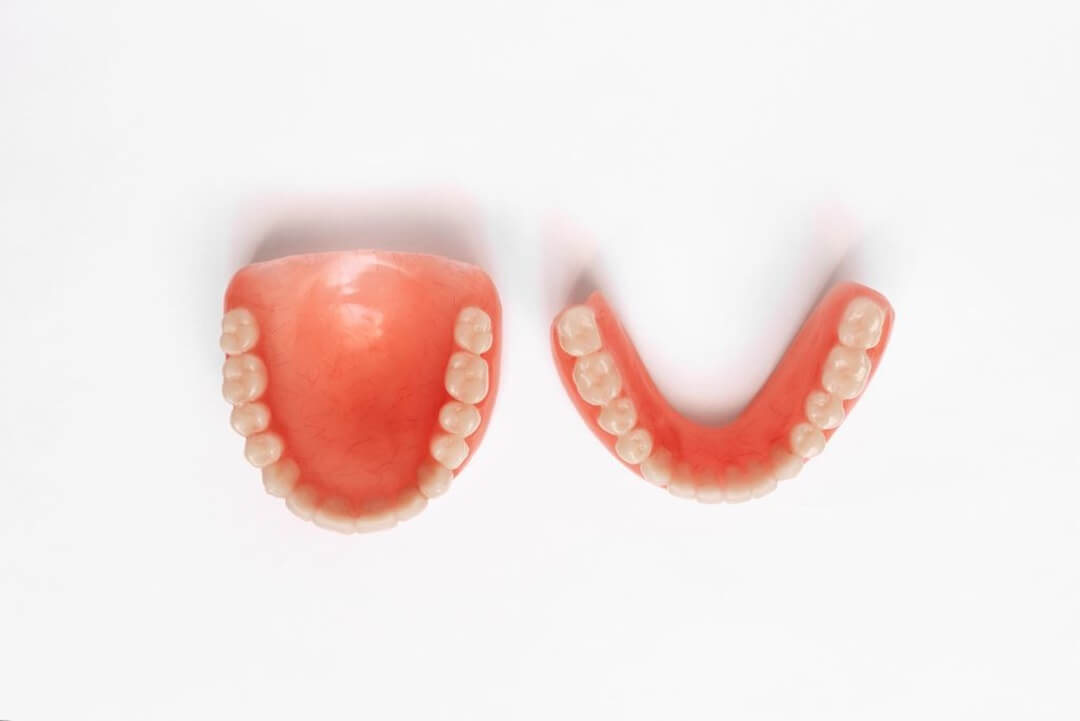
Complete Dentures
When you hear dentures, complete sets are probably what you think of. These are glued into place with a store-bought adhesive. They replace the gums and teeth or a full arch, which could be the top or bottom. These are often the least expensive choices for total teeth replacement but have some downsides. Dentures aren’t as comfortable, or secure, and often don’t look as natural.
Securing a Smile for a Lifetime
In wrapping up, it’s clear that dental implants represent a significant advancement in dental care, offering a long-lasting and aesthetically pleasing solution for those seeking to replace missing teeth. With the potential to last a lifetime, implants are a testament to the wonders of modern dentistry. However, their longevity is not just a product of advanced technology but also the result of diligent care and maintenance.
Remember, the key to ensuring the endurance of your dental implants lies in a combination of good oral hygiene, healthy lifestyle choices, and regular dental check-ups. While the crown may need replacement over time, the implant itself can continue to serve you well for many years. By avoiding harmful habits like smoking and addressing issues like teeth grinding, you can further enhance the lifespan of your implants.
In conclusion, dental implants are more than just a dental procedure; they are a long-term investment in your oral health and quality of life. They require a commitment to care, but the reward is a confident and beautiful smile. So, cherish your dental implants as you would your natural teeth, and you can look forward to many years of a happy, healthy smile.
Ready for a Lifetime of Smiles with Soundview Family Dental?
If you’re considering dental implants or need advice on caring for existing ones, Soundview Family Dental in Edmonds is here to guide you every step of the way. Our expert team is dedicated to providing top-notch dental care, ensuring your implants last as long as possible. Whether it’s your first inquiry about dental implants or time for a routine check-up, we’re committed to helping you maintain that perfect smile. Don’t hesitate to reach out and start your journey to a lifetime of beautiful smiles.
Contact Us at (425) 563-6360 to schedule your appointment today. Let’s keep that smile bright and healthy together!

